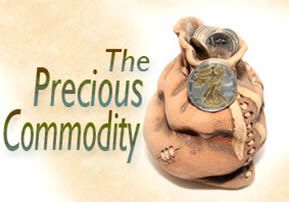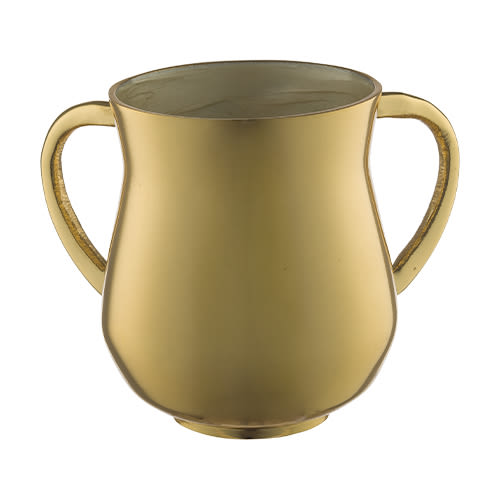
The Precious Commodity
One who believes that "there is nothing other than Hashem" never blames himself or others for anything, since everything comes from Hashem...

Precious, Loved, and Delightful
Rebbe Nachman uses three terms to describe the king’s affection for the princess: “This daughter was very precious to him. He loved her exceptionally, and took great delight in her.” These three terms all refer to emuna.
Precious – emuna is more precious to Hashem than anything that the world tends to consider valuable, rare, or important. For example, people give high regard to a scholar. But, if the scholar lacks emuna, he loses his stature, for Rebbe Nathan says specifically (see Abridged Likutei Moharan, I: 31): “A scholar alone (without emuna), is surely nothing, for one can be a scholar and an evil person at the same time.”
Loved – Hashem loves emuna very much, as Rebbe Nachman writes (Sefer HaMidot, Emuna): “By virtue of emuna, a person is as beloved to Hashem as a wife is to her husband.”
Delightful – Emuna is the delight of Hashem (See Likutei Moharan, I:97). Hashem adorns Himself with and delights in the emuna of the righteous, and loves to see what they accomplish with their prayers. Prayer is emuna. People with emuna are delightful to Hashem; the tzaddikim with steadfast emuna are Hashem’s delight in creation.
Everything is For the Best
Now that we know that emuna is the world’s most precious commodity, and that the entire purpose of Torah, mitzvot, and creation is to bring a person to emuna, we should know that the main principle of emuna is our faith that everything is for the best.
Any emuna that lacks the faith that everything is for the best is incomplete is accompanied by fantasies and disappointment. Emuna is synonymous with happiness and with prayer. One who claims to have emuna, but who is unhappy, and who fails to walk around with a song on his lips and with dancing feet that praise and thank Hashem, is contradicting himself. For one who truly believes that everything is for the best will always be singing, dancing, and happy. A person that only claims to have emuna, but who doesn’t pray for all his needs, is again contradicting himself. If he had complete emuna, especially that Hashem is standing there right over his shoulder listening to every syllable of his prayers, he’d certainly pray at length and in great detail for all his needs.
In addition, we should know that the emuna that everything is for the best includes and encompasses all the aspects of emuna. One who believes that everything is for the best certainly believes in Divine providence, or hashgachah pratit. Everything is for the best because everything comes from Hashem as magnificent individually-tailored Divine providence. If anything in the world was left to chance, it would be impossible to declare that everything is for the best.
When we believe that everything is for the best, we certainly believe that everything that occurs in our lives has a message, a reason, and an ultimate purpose whose objective is to stimulate us to get closer to Hashem.
There is Nothing other than Him
In addition, when we believe that everything is for the best, we believe that there is no power in the world other than Hashem. One who believes that “there is nothing other than Hashem” never blames himself or others for anything, since everything comes from Hashem. As such, a person is spared from a long list of negative emotions such as anger, revenge, and frustration.
When we refrain from tormenting ourselves after a setback in life, we avoid depression, self-flagellation, and feelings of guilt, bitterness, and low self-esteem. When we don’t blame others for our misfortunes, we don’t fall into traps of hate, revenge, anger, and the like. By clinging to the belief that everything is for the best, we avoid every emotional difficulty in the world.
For example, with emuna, we avoid jealousy. King Solomon writes that jealousy causes the decay of one’s bones – in other words, jealousy does serious damage to a person. Imagine a poor person who has emuna; he’s not jealous of the rich person, for he believes that Hashem does everything for the best, and if he doesn’t have much money, that’s Hashem’s will too. As such, he stays emotionally healthy, and avoids the pitfalls of jealousy and envy.
When we believe that everything is for the best, we’re not constantly competing with other people, for we know that Hashem is leading us down our own special path for our own ultimate benefit – all according to our individual tikkun and task in life. With this in mind, we need not look enviously at anyone else, for each of us is doing his or her own prescribed mission on earth.
With emuna, we’re never sad or disappointed. Even if someone is mean or unfair to us, we believe that everything comes from Hashem and that everything is for the very best. Rather than focusing on the person who’s mistreating us, we focus on Hashem who is doing everything for our ultimate best.
We can conclude that the emuna that everything is for the best is the principle type of emuna that we should all pray for, since this emuna is a package deal of healthy emotions, favorable character, and salvations for all our problems. Although the road to emuna is not easy, knowing that this is the right road to take is already a major achievement. We should also strive to understand the value of what we’re searching for: the entire redemption of our people as well as our own personal redemption depends on emuna.
Happy is the person that tenaciously searches for the lost princess – emuna – for he or she certainly brings untold gratification to the King, Hashem. Even when we don’t see immediate results, we should be strong of heart. With desire and perseverance, each one of us will ultimately find our own lost princess, as Rebbe Nachman allegorically promised. With a strong will, each of us will attain complete emuna, which will hasten the spiritual rectification of the entire universe.













Tell us what you think!
Thank you for your comment!
It will be published after approval by the Editor.